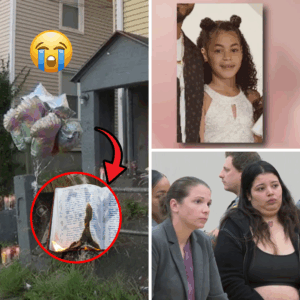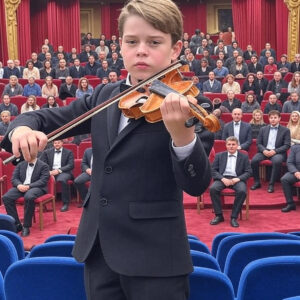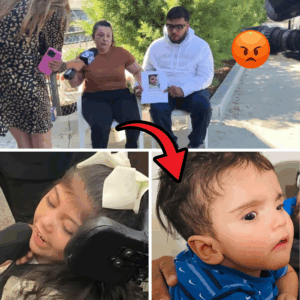In the sun-scorched expanse of Riverside County, California, where sprawling desert communities like Cabazon cling to the edges of palm-lined oases and the Santa Rosa Mountains loom like silent sentinels, the disappearance of 7-month-old Emmanuel Haro in August 2025 unleashed a wave of heartbreak that rippled far beyond the dusty streets of this forgotten corner of the Inland Empire. What began as a frantic Amber Alert—a cherubic baby boy with chubby cheeks and a tuft of dark hair, last seen in a onesie printed with tiny dinosaurs—quickly unraveled into a nightmare of deception, abuse, and unimaginable loss. On October 16, 2025, Jake Mitchell Haro, the 32-year-old father of the missing infant, stood before a Riverside County courtroom, his face etched with a mix of resignation and remorse, and pleaded guilty to second-degree murder, assault causing great bodily injury to a child resulting in death, and filing a false police report. The plea, entered without a formal deal from prosecutors but accepted by Superior Court Judge Dennis A. McConnell, marked a grim pivot from the couple’s initial not-guilty stance, confirming the community’s darkest fears: Emmanuel was not kidnapped, as his parents had claimed, but murdered at the hands of the very man who should have protected him. With sentencing looming on November 3, 2025, Haro’s confession has peeled back layers of a case steeped in prior warnings ignored, systemic failures exposed, and a family’s shattered facade, leaving advocates for child welfare to demand accountability in a system that twice spared a predator.
The saga ignited on the evening of August 14, 2025, in the parking lot of a Big 5 Sporting Goods store in Yucaipa, a nondescript retail strip 60 miles east of Los Angeles where suburban normalcy masks the undercurrents of struggle. Rebecca Rene Haro, 41, Emmanuel’s mother, burst into the store around 8 p.m., cradling her black eye and hysterical, claiming a harrowing assault: while changing the baby’s diaper in their white SUV, a Hispanic man had approached, struck her unconscious, and snatched Emmanuel from his car seat. “He said ‘Hola,’ and then everything went black,” she told arriving deputies, her story tumbling out in sobs. Jake Haro, who had been inside the store selecting camping gear, rushed out to corroborate: “I heard her scream—by the time I got there, he was gone with our boy.” The narrative, laced with racial undertones that swiftly drew scrutiny, triggered an immediate Amber Alert, plastering Emmanuel’s photo—wide brown eyes, a gummy smile—across California freeways and news feeds. Highway Patrol choppers swept the San Bernardino Mountains, K-9 units scoured nearby washes, and volunteers from as far as San Diego combed arroyos, their flashlights cutting through the twilight haze.
The response was frenzied, a testament to the raw terror of a child’s abduction in an era haunted by echoes of Etan Patz and Madeleine McCann. Riverside County Sheriff’s deputies flooded the scene, interviewing witnesses who recalled a “distraught woman” but no assailant fleeing with a bundled infant. Ashlee’s black eye, photographed meticulously, raised immediate red flags—swelling inconsistent with a stranger’s punch, more akin to a self-inflicted bruise or domestic altercation. Jake’s timeline, too, frayed under probing: he claimed mere minutes separated the scream from his arrival, yet store CCTV showed him lingering over fishing lures for 12 minutes. By dawn on August 15, the investigation pivoted inward. Detectives, led by Sgt. David Crum of the Homicide Unit, executed a search warrant on the Haros’ Cabazon rental—a weathered double-wide trailer on a sun-baked lot ringed by chain-link and tumbleweeds. What they found chilled the air: Emmanuel’s dinosaur-themed nursery pristine but empty, a half-empty bottle of formula on the changing table, and faint bloodstains on a crib sheet, later confirmed as the infant’s via DNA. No signs of forced entry, no stranger’s footprints in the dust—just a pacifier clutched in a tiny sock, discarded like a forgotten toy.
As days blurred into a week, inconsistencies mounted like storm clouds over the San Gorgonio Pass. Ashlee’s story evolved under interrogation: the attacker’s “Hola” morphed into Spanish curses, his description from “stocky Hispanic male” to “tall white guy with a tattoo.” Jake, a burly 6’2″ former construction worker turned delivery driver, grew evasive, his alibis crumbling when cell tower pings placed him—and only him—near a remote desert wash in Cabazon hours before the “kidnapping.” Forensic divers dragged the wash on August 20, unearthing a weighted duffel bag containing Emmanuel’s car seat, smeared with the same blood traces. Autopsy impossible without a body, but trace evidence screamed homicide: microscopic fibers from the Haros’ living room rug embedded in the seat, and a faint chemical residue suggesting hasty cleanup with bleach. By August 22, warrants sealed the deal: Jake and Ashlee were arrested at their trailer, faces ashen as deputies hauled them away in unmarked vans. “We have probable cause to believe Emmanuel Haro is deceased and his death was at the hands of his parents,” District Attorney Mike Hestrin announced in a 45-minute presser, his voice steel-edged. “This was not a random act of violence, but a culmination of prolonged abuse.”
The charges landed like thunderclaps: for Jake, second-degree murder (15-to-life), child assault with great bodily injury resulting in death (up to 25 years), and misdemeanor false reporting (up to a year). Ashlee faced identical counts, her role pinned as accomplice in the cover-up. Bail denied for both—$2 million each—citing flight risk and danger to the community. Court documents, unsealed October 1, unveiled a damning timeline of torment. Emmanuel, born January 2025 to the Haros after a fraught pregnancy marked by Ashlee’s untreated postpartum depression, endured “non-accidental trauma” from birth. Hospital records from Loma Linda University Children’s Hospital detailed unexplained bruises on his tiny arms in March, dismissed as “roughhousing” by Jake. A April well-baby visit noted a fractured rib, chalked up to a “fall from the changing table.” By July, Emmanuel’s cries turned feeble; neighbors in their Cabazon trailer park recalled “screaming matches” behind thin walls, Jake’s bellows of frustration piercing the night. The murder, per affidavits, occurred August 13—Jake, in a rage over the baby’s incessant wailing during a teething episode, shook Emmanuel violently, causing fatal brain trauma. Ashlee, home from her shift at a Yucaipa diner, helped stage the kidnapping narrative to buy time, driving to the wash to dispose of the body in a shallow grave now scoured by coyotes and erosion.
Haro’s guilty plea on October 16 arrived like a thunderclap in Riverside’s Hall of Justice, a squat concrete fortress where justice unfolds amid the scent of stale coffee and fluorescent hum. Entering the courtroom shackled, his orange jumpsuit stark against the wooden benches, Jake faced a gallery packed with Emmanuel’s “warriors”—a grassroots cadre of aunts, cousins, and advocates from the Uvalde Foundation for Kids, who had rallied with posters and prayers since the Alert. Judge McConnell, peering over half-moon glasses, read the charges: second-degree murder, admitting malice aforethought; assault, acknowledging the “shaken baby” mechanism that severed neural pathways in seconds; false report, confessing the fabricated assault story to deflect suspicion. Jake’s voice, barely above a whisper, cracked on “guilty,” tears streaming as he bowed his head. No plea deal—just a raw admission to the court, sparing a trial but unlocking the full weight of sentencing. “I failed him,” he murmured to his public defender, words captured by court audio and leaked to reporters. Ashlee, appearing via video from Robert Presley Detention Center, maintained her not-guilty plea, her preliminary hearing now synced to November 3 alongside Jake’s fate. “She’s complicit, but her day comes,” Hestrin vowed post-hearing.
The plea ripped open wounds long festering, exposing a litany of systemic lapses that allowed a monster to roam free. Jake’s rap sheet, buried in San Bernardino County files, revealed a 2018 felony child endangerment conviction: his then-10-month-old daughter Carolina, from a prior marriage, hospitalized with multiple fractures—arms snapped like twigs, ribs cracked from “bathing accidents.” Jake claimed a slip on a wet floor; prosecutors, swayed by a sympathetic judge, offered probation: four years supervised, 180 days jail on work release, and mandatory parenting classes he skipped. “A second chance,” the court called it, ignoring red flags like Ashlee’s own domestic battery misdemeanor in 2020. Emmanuel’s Warriors, led by aunt Carla Jaramillo—a fiery Lompoc teacher who quit her job to advocate—blasted the leniency. “He broke one baby, got a slap; now he’s stolen another life,” Jaramillo wept at a October 20 vigil in Cabazon Park, 200 strong clutching candles and Emmanuel’s photos. The Uvalde Foundation, scarred by their namesake’s 2022 school massacre, decried the “revolving door”: “Probation for fractures? It’s blood on the system’s hands.” Hestrin, facing backlash, pledged reforms: mandatory risk assessments for child abusers, inter-agency data sharing to flag repeat offenders. “Emmanuel’s death was preventable,” he conceded in a November 1 op-ed for the Press-Enterprise. “We failed him—now we fix it.”
As November 3 dawned crisp over Riverside, the sentencing loomed like a storm front. Jake, transferred to Smith Correctional Facility, prepared for Judge McConnell’s gavel: prosecutors seeking 31 years to life, folding in the 2018 sentence as consecutive. “No mercy for a man who twice crushed innocence,” Deputy DA Elena Vasquez argued in filings, citing Jake’s jailhouse denial of abuse—”It was an accident”—as manipulative gaslighting. Ashlee’s hearing, concurrent, could yield charges dropped to accessory if she flips, but her silence suggests a trial. Community vigils swelled: a “March for Emmanuel” snaked through Yucaipa’s Main Street, balloons in dinosaur hues released skyward. Jaramillo, voice hoarse from chants, vowed, “Justice isn’t vengeance—it’s protection for the next baby.” Donors poured $150,000 into a memorial fund for child advocacy, while lawmakers in Sacramento mulled “Emmanuel’s Law”: zero-tolerance probation for infant abusers.
In Cabazon’s quiet trailers, where wind chimes toll like dirges, the Haro home stands boarded, a ghost of what-ifs. Neighbors, once waving at the stroller-pushing family, now whisper of “the devil next door.” Jake’s ex, Carolina’s mother, broke silence in a KTLA exclusive: “I warned them—he’s poison. But love blinds.” Ashlee’s kin, fractured, rally quietly, praying for her redemption. For Emmanuel, whose giggles echoed in viral videos now viewed 5 million times, legacy lives in reform’s promise. His tiny frame, lost to desert sands, haunts a nation— a stark reminder that evil often hides in plain sight, behind a father’s smile. As McConnell’s courtroom fills on November 3, one truth endures: justice delayed is innocence denied, but spoken, it echoes eternal. For baby Emmanuel, may the gavel ring like a lullaby long overdue.




